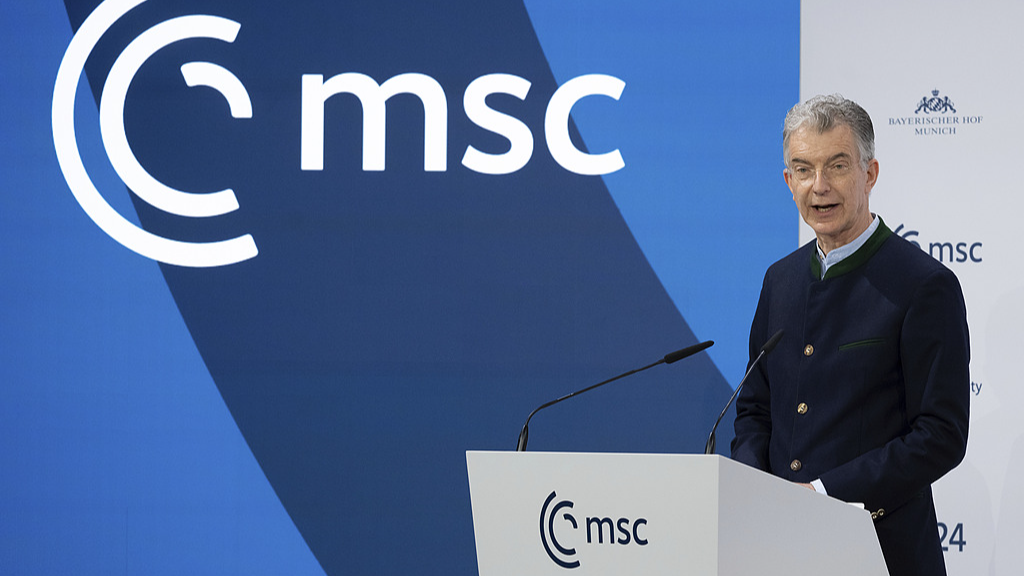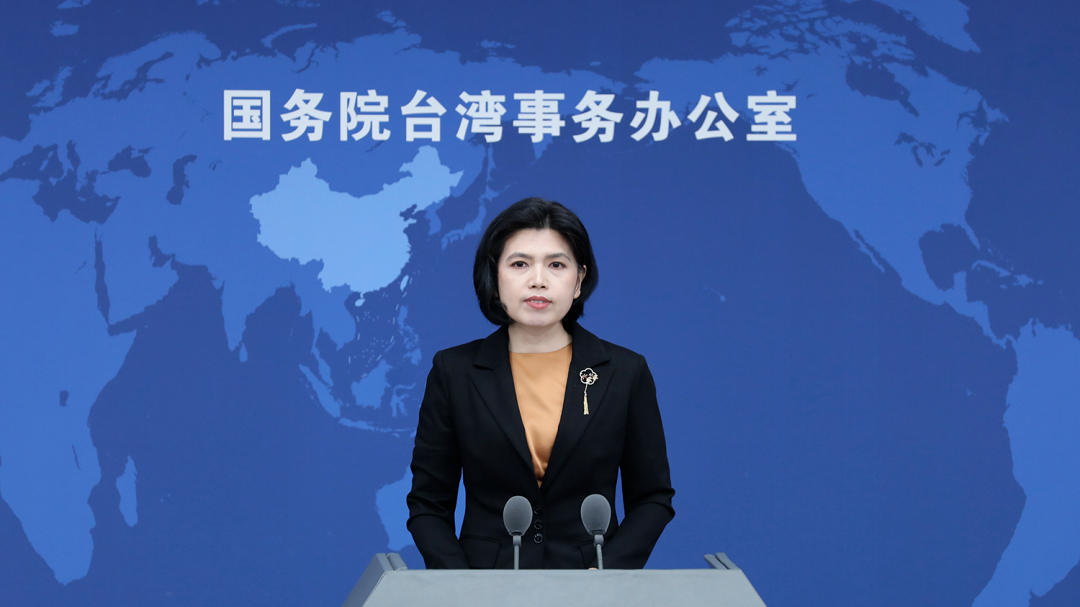Editor's note: CGTN's In-Depth Insights invites renowned experts to deliver extensive analysis and commentary on headline stories. Sun Chenghao is a fellow at the Center for International Security and Strategy under Tsinghua University. The article reflects the author's opinions and not necessarily the views of CGTN.
On-site at the Munich Security Conference, every guest seemed to be in a hurry. As a participant in this year's Munich Young Leader program, I had the opportunity to closely observe this major conference on European security and transatlantic relations. Looking at this year's agenda, the Ukraine crisis, transatlantic relations, and artificial intelligence (AI) remained the key focal points. Although China-U.S. relations were not explicitly featured in the titles of major sessions, discussions across various panels were inevitably shaped by the dynamics of this bilateral relationship.
Following keynote speeches by U.S. Vice President J.D. Vance and Chinese Foreign Minister Wang Yi, who is also a member of the Political Bureau of the Communist Party of China (CPC) Central Committee, discussions on China-U.S. relations intensified. Some European colleagues shared their disappointment with Vance's speech, which they felt was more about "lecturing" Europe. In contrast, they perceived greater certainty and confidence in the remarks from the Chinese side. Many, however, also expressed deep concerns about the trajectory of China-U.S. relations.
Based on the current situation, the Trump administration's China policy will continue to revolve around competition while also exhibiting a transactional nature. Through high tariffs and technological restrictions, the U.S. government aims to pressure China into making concessions in key areas. This "competition + transaction" approach is evident in multiple aspects, particularly in the areas of tariffs and technology.
A prime example is the tariff war implemented by the Trump administration against China. On February 1, 2025, Trump signed an executive order imposing a 10-percent tariff on imports from China, citing issues such as fentanyl as justification. Trump warned that additional tariffs would follow if an agreement with China was not reached. While this measure ostensibly seeks to exert economic pressure on China through tariffs, it actually reflects a transactional mindset – using tariffs to force China into making concessions in exchange for more favorable negotiation outcomes.
Furthermore, the U.S. is considering imposing additional sanctions on Chinese companies in the semiconductor and AI sectors, including restricting tech firm Nvidia from selling the H20 chip specifically designed for the Chinese market. If implemented, these policies will further highlight the "competition + transaction" mindset in the U.S. approach to technology. A series of U.S. policies are pushing global technological competition to the brink of confrontation, aiming to suppress and restrict China's technological progress in an attempt to force concessions.
Although the Trump administration's China policy may bring some short-term economic benefits to the U.S., in the long run, this "competition + transaction" mindset will lead to a series of more severe risks.
First, economic losses would continue to mount, and global supply chains could be disrupted. The Trump administration's tariff hikes and technological restrictions against China have triggered retaliatory measures, with China announcing additional tariffs on certain U.S. imports. These actions will negatively impact the U.S. economy, exacerbating domestic inflationary pressures and running counter to the Trump administration's goal of reducing inflation. Moreover, U.S. tariffs on China not only undermine normal bilateral trade relations, but also weaken global supply chain stability, leading to short-term price distortions and long-term economic instability.
Second, heightened technological confrontation could disrupt the global innovation landscape. The Trump administration's aggressive technology policies are driving global tech competition toward a "bloc-based" structure. By coordinating with allies and partners to suppress China's technological development, the administration aims to curb China's progress, resulting in the fragmentation of the global tech ecosystem. For instance, the emergence of Chinese-developed AI models like DeepSeek, which challenge the U.S. approach of relying on high computational power and capital-intensive investment, may prompt the Trump administration to escalate pressure on China's technology sector under the guise of safeguarding U.S. interests. However, such actions will only fracture global tech cooperation and stifle innovation potential, ultimately harming global technological progress as a whole.
Third, it may lead to strategic miscalculations and unnecessary confrontation. By viewing China-U.S. relations as a zero-sum game, the U.S. risks misjudging and misunderstanding China's responses. The Trump administration seeks to pressure China into accepting deals more favorable to the U.S. through tariffs and technological restrictions, yet it often underestimates China's resolve to implement countermeasures and defend its legitimate interests, further escalating tensions. While the U.S. emphasizes a transactional approach, it has not altered the underlying logic of strategic competition with China. This not only fails to effectively resolve issues but also increases the risk of heightened confrontation between the two countries.
Recently, the U.S. strategic community has been engaged in a debate over the "endgame" of strategic competition with China, questioning its ultimate goals. Unfortunately, this debate has not critically examined the competitive framework itself, significantly reducing its value. To ensure the stability and healthy development of China-U.S. relations, Washington must undertake a fundamental shift in its China policy. Moving beyond the "competition + transaction" mindset is crucial – what is needed is a rational, pragmatic, and long-term approach to cooperation.
First, the U.S. should prioritize win-win cooperation and abandon the zero-sum mindset. As the world's two largest economies, China and the U.S. stand to benefit not only individually but also globally through collaboration. Washington should move beyond the zero-sum perspective and actively promote cooperation rather than resorting to tariffs and sanctions to pressure China or provoke confrontation. A stable and sustainable China-U.S. relationship depends on mutual gains, and using maximum pressure to force concessions is neither a wise nor effective approach.
Second, the U.S. should enhance communication and move beyond transactional thinking. It should not treat China-U.S. relations merely as a bargaining game, nor should it rely on coercive measures like tariffs and sanctions to resolve disputes. Instead, Washington must strengthen dialogue mechanisms at various levels and across different sectors to maintain effective communication. Negotiation and consultation should be the primary means to seek common ground. The future of China-U.S. relations should be rooted in shared interests and global responsibilities rather than a "winner-takes-all" or "your-loss-is-my gain" mentality.
Third, the U.S. should address transnational challenges and advance global governance. The world continues to face pressing common challenges, including climate change, energy crises, and global health issues. The U.S. should abandon its competition-driven approach and work alongside China to tackle these global problems. As multipolarization gains momentum – an issue highlighted in this year's Munich Security Report – China and the U.S. should not see each other as adversaries but as partners in shaping a fairer, more reasonable, and more effective global governance system.
As Foreign Minister Wang said at the Munich Security Conference on Friday, global challenges need to be jointly addressed by China and the United States, and this is also an international responsibility that both sides should shoulder.



















